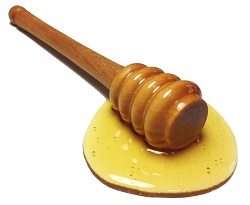
Important Honey Information From 7 FAQs
Here you will find some very useful honey information from several questions which I think are frequently asked by people who are exploring honey use.
Question 1: Can diabetics use honey? I have been told that diabetics can use honey. Is that true?
Ans: For diabetics, it is recommended to start with small dosages, a teaspoon, then gradually increase to two, etc as you monitor your blood sugar closely. Actually, if one has been taking highly processed white table sugar, I don't see why honey, a much more superior form of sugar cannot be tolerated. As some commercial honeys are adulterated by glucose, starch, cane sugar, and even malt, make sure you are consuming pure quality honey from a trusted supplier. More information on this topic in Is Honey Allowed in Diabetic Diet?
Question 2: Both honey and table sugar contain fructose and glucose. So, chemically they have the same basic sugar units. Is it correct?
Ans: It is true that both honey and table sugar have the same basic sugar units. However table sugar, or sucrose, has glucose and fructose hooked or amalgamated together, whereas if you look at honey properties, fructose and glucose remain in individual units.
Question 3: Invert sugar is sucrose broken down into glucose and fructose. So, honey is an invert sugar. Is it correct?
Ans: This statement is correct. Chemically, honey is invert sugar. It has a mishmash of both glucose and fructose. The only difference is that honey is honey bee-processed, whereas invert sugar (e.g candies) is man-made!
Question 4: Honey contains more calories than table sugar. Does it imply that it is therefore less healthy to eat honey?
Ans: We all know that any excessive intake of calories in any form is not good. Yes, honey has more calories, but we actually need to use less of it since it is sweeter than table sugar. As a result, in the long run, you may in fact consume even less amount of calories that you would with table sugar. Moreover, unlike table sugar which is empty calories, honey has nutritional value.
Question 5: Compared to table sugar, honey is sweetener. This is because it has more fructose which does not convert to energy as efficiently as glucose. So does this mean honey is less healthy?
Ans: Yes, >honey contains more fructose, but precisely because it is sweeter, you need less of it.
Question 6: If spores are harmful to babies, why aren't they removed in the pasteurisation process of making commercial honey?
Ans: All new mothers, please take note of this honey information. Pasteurization cannot remove spores as they are very resistant to killing by physical and chemical agents. To kill spores which are harmful to babies, processors must heat the honey to at least 250 degrees Fahrenheit, under pressure for at least three minutes, but this cannot be done as honey burns under this high temperature, its flavor changes and some health beneficial honey properties are also destroyed. This explains why for so many honey FAQs concerning whether it is okay to feed infant honey, the answer is also a "NO".
Question 7: I was told that honey does not spoil. What if I mix it with water and leave it? Will it go bad?
You will learn from most sources of honey information that "honey does not spoil" and it has no expiry date.Nothing will grow in naturally antibiotic and antiviral honey as long as the moisture content remains under 18%. Natural, raw honey varies from 14% to 18% in moisture content. However, when water is added to honey, natural airborn yeasts can become active in the honey water. So your honey water will turn bad eventually.
End of "Important Honey Information From 7 FAQs". Back to Honey Nutrition Facts.
Also, relevant to this page is "Just Ask" -- where you can view honey questions posted by visitors.